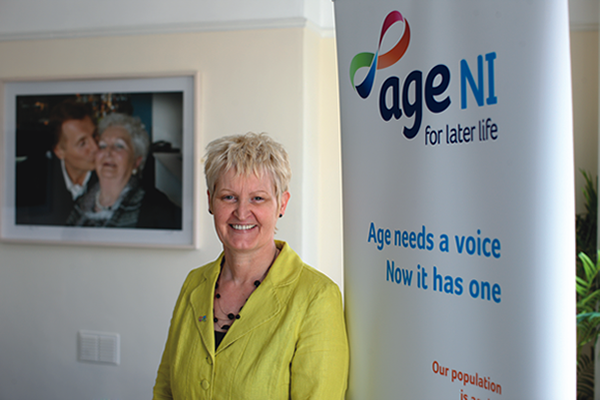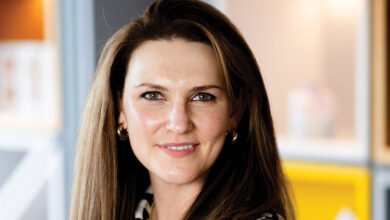A bounty in longer lives
Age NI Chief Executive Anne O’Reilly talks to Owen McQuade about why ageing holds plenty of opportunities for society and how government and business can take the challenge it poses more seriously.
The benefits and not the burdens of ageing stand out to Anne O’Reilly 12 months into leading Age NI. Formed by the merger of Age Concern Northern Ireland and Help the Aged, the organisation forms a “very strong platform” for older people and O’Reilly sees it having the potential to make society a more age-friendly place for the growing number of citizens living longer.
“We have a very strong platform: a strong organisation with a strong message, to enable us to use our influence and our assets to good effect,” she remarks. There was a consensus for the merger among members of the public, politicians and funders.
“The idea was to really maximise our influence, our positioning and more importantly our impact for older people. And the timing seemed absolutely perfect to do something quite fundamental in terms of our organisations coming together.”
A single organisation was needed to better influence how we plan for our future. Age NI can therefore “add a lot of value and support” to both the public and private sectors, encouraging them to think differently about how they plans for older people.
While both previous charities had a long and proud track history of working for older people, they increasingly recognised that they would be better forming “one strong voice” in Northern Ireland.
Later life without limits
The key message is that Northern Ireland’s population is ageing. It is now home to more people aged over 50 than under 19 and, by 2029, 27 per cent of the population will be over 60 compared to around 19 per cent today.
“That is a tremendous, tremendous asset for any society,” she continues, “and while it slips off the tongue, our position is that we see this change as a demographic bounty and not a burden.”
However, this view is often not shared enough in the public and private sectors. Age NI sees a need to “balance the thinking” around ageing and older people and thinks this is “thankfully” starting to happen.
“Firstly there needs to be a shift towards maximising older people’s capability to work, live and contribute in their communities,” contends O’Reilly.
In addition, Age NI wants the “remarkable achievement” that people are living longer to be acknowledged: “If you’re in good health and have a reasonable income, it can be a wonderful time of opportunity and to do the things you maybe wanted to do through an adult working life but didn’t have time.”
Not all older people, though, have an enjoyable later life.
“Equally within that group, there are people that are still struggling with health and income inequality in particular,” O’Reilly explains. “People are pulled together by their age but there as many differences within the age group as there are the same and a stronger sense of shared solidarity is required.”
Her own view is that society cannot afford to wait to address this challenge.
“Increasingly, if you retire at 60, you could live another 40 years. It’s a powerful figure to think that people born today could live to be 100,” she states. “Ageing is about all of us and the things we do now and the things we set in train now are for all our futures.”
Opportunities and challenges
Keeping with the ‘bounty not burden’ theme, Age NI wants people to be able to continue working for as long as they want.
“Particularly in the economic circumstances that we’re living in now, I think older people more and more want that choice,” she remarks. “And as the age of retirement increases, we have somewhere in the region over the next 10 years about 30,000 additional women in the work place to plan for.”
Organisations need to consider how they are planning for extra numbers of people in the work place, the opportunities they can offer them and the possibility that people will seek second careers. In some sectors, including nursing, social care and retail, employees are increasingly hard to find and older people could fulfil those roles.
Health and social care, which takes up nearly half of the Assembly’s budget, is naturally high on their agenda, as they call for a greater resource shift from hospital towards care in the community. Only one in five older people (21 per cent) receive some form of care but half of these say they are not getting their needs met in the way they would wish.
It’s time to go back to the drawing board, O’Reilly contends. New approaches and new ways of planning are needed, particularly when the number of older people over 80 is set to double and they are most likely to use health and social care services. “Once you’re in the system, it’s very hard to get out and what you have is what we call the vicious cycle of care where people are in and out of hospital.” This is an intolerable situation, in her opinion, which exacts a high price to the individual and the state.
The “wrong hard choices” are sometimes being made and, in Age NI’s view, it would make economic sense to make social care a greater financial priority so that “older people would be where they want to be: in their own home.”
Providing care at home for people with dementia is, one of the organisation’s main services.
While they know this works, extra financial costs are certain as the number of cases rises above 24,000. On average, social care for an older person costs £3,500 per year and that figure rises to £18,000 when they experience dementia.
“The numbers are overwhelming at times,” she admits but this sense of paralysis can be overcome with some “creativity or rebalance” in how services are designed. “We could play a bigger service delivery role based on research which could showed that we can deliver at 30 per cent less cost than the public sector,” she adds.
“There’s so many incentives for change but there seems to be a fear of making fundamental change,” she says, adding the analogy that a good crisis should not be wasted.
Basically, it is time to take stock and Age NI wants to use more rigorous research and economics to provide a structural analysis of the situation: “We think part of our job is to part of building the solution by using our research, having much more of an economic lens and working together.”
As the next Comprehensive Spending Review approaches, and the organisation wants to see a “different political and policy discourse” take place on ageing, informed by its analysis.
Poverty and inequality
The downside of this time of bounty and opportunity is that there are still “major inequalities” in health and income and opportunity, which are major barriers in later life.
O’Reilly highlights that 21 per cent of older people still live in poverty and 47 per cent experience fuel poverty. “These are damming figures,” she contends.
An analysis of excess winter deaths over last 10 years puts the figure at 400 in 2003-2004. A decrease followed, then an increase to 1,000 deaths in 2008-2009.
“Older people are paying a high price for inaction on fuel poverty in particular,” she states. While Margaret Ritchie has set aside £20 million to deal with the problem, Age NI has a much more ambitious demand: £120 million every year for the next five years.
Age NI is also calling for action in Northern Ireland on automatic payment of benefits to reduce the very high level of older people not claiming the benefits to which they are entitled.
“While there are no short term fixes, politicians must commit to immediate action to progressively eradicate poverty in later life.”
Commenting on this inequality, O’Reilly remarks: “We want to see wide broad opportunities irrespective of age – to see people for who they are, not for their age – but equally we have to stay very sharply focused advocating for those where later life, is going to be much more difficult.”
Thinking smarter
Age NI advocates the need to adopt a lifecourse approach to education and learning so that people can continue to learn as they age. It believes that “good interventions” can be made in later life e.g. taking up a course or a new career.
Furthermore, a quarter of people over 60 are members of community organisations, which taps into volunteering and makes a contribution to wider society. Many of these groups are “struggling to survive” but the work that is down for relatively small amounts of money is an asset that we could lose at our peril.
“Everything’s going further upstream and we’re forgetting about further back in the chain,” O’Reilly says in summary.
As well as engaging with politicians, Age NI also calls on journalists to show less sensationalism when reporting attacks on older people.
“We’re trying to get across to the media in particular that, yes, the attacks when they happen are devastating for the individual but it’s small in terms of the numbers. The bigger impact is that it leaves 66 per cent of that age group in fear of crime.”
Government agencies are also encouraged to provide a faster response to victims of crime, and Age NI offers to visit any older person who is attacked.
With the potential introduction of community planning, Age NI hopes that health trusts and councils will produce more age-friendly policies. Locally, Belfast has shown leadership by setting up an inter-sectoral strategy group, involving the city council, trust, Housing Executive, and Age NI to think about a more integrated approach to ageing and older people in the city.
Entrepreneurship
Age NI takes great pride in its work with older people with dementia but wants the health trusts to start working with it in a “much more pro-active way”. The organisation provides residential and domiciliary care to around 3,000 clients.
People still do not know the benefits and care to which they are entitled; 10,000 of them seek advice and information from Age NI each year. Face-to-face emotional support and a mobile handyman are two practical examples of its wider work.
In contrast to the perception that voluntary and community sector relies on state hand-outs, Age NI is required to raise 96 per cent of our own income; the remaining 4 per cent comes from the DHSSPS. It runs its own trading company, selling financial products and services, including travel insurance with no age limit.
“We see older people as consumers. The UK grey pound is about £100 billion and growing. Commercial companies are beginning to wake up to that marketplace … We see our trading company as a way of tackling market failure for this age group.”
Other sources of income include contracted services and public donations.
“The leadership of an organisation like Age NI is not like a public body,” she emphasises, pointing out that it has to generate its £6 million budget, as well as spending it well: “Our surplus goes back into the services and activities that we provide. We’re probably more akin to the private sector in many ways.”
While many policy-makers have sympathy with the voluntary sector, she wants to see this translated into action. In her own field, the political profile of older people has never been higher with them casting an estimated four out of 10 votes in the general election.
“There is a tipping point emerging in terms of dealing with a growing ageing population who will not be as passive,” O’Reilly says in conclusion.
“We’re strengthening our voice and our authority through strong research and evidence and economics. We are not naive. We work in the art of what’s possible. Certainly we have strong aspirations and we want to see things differently.
“We need to stretch society, we need to stretch thinking, while at the same time holding the line on frontline services and activities that matter most, supporting our shared goal of creating Northern Ireland as a good place to age, and age well.”






